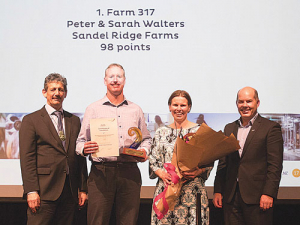Record final milk price for Miraka suppliers
Farmers supplying milk to Taupo-based processor Miraka are getting a 2024-25 season base milk price of $10.16/kgMS.
 Top Miraka suppliers Peter and Sarah Walton with company chairman Kingi Smiler (left) and CEO Richard Wyeth.
Top Miraka suppliers Peter and Sarah Walton with company chairman Kingi Smiler (left) and CEO Richard Wyeth.
Taupo dairy company Miraka will pay an extra $3 million to its suppliers as part of an incentive scheme for good farming practices. The scheme is voluntary.
The company 12 months ago launched Te Ara Miraka which rewards its suppliers for meeting five criteria -- people, environment, animal welfare, milk quality and prosperity. Within these are 31 criteria, of which farmers must meet 13. They get points for meeting the criteria -- possible total 100.
A supplier who meets the mandatory criteria gets some incentive, but achieving 100 points will earn him an extra 20c/kgMS at the end of the season, says Miraka chief executive Richard Wyeth.
This year Peter and Sarah Walton, farming at Whakamaru, south Waikato, were the first to win the Te Ara Miraka award, scoring 98 out of the possible 100 points.
The top ten suppliers each get a certificate and the Waltons got a special trophy at Miraka’s celebration awards evening.
“I am absolutely happy with the results,” Wyeth says. “It’s great that the Waltons came on board and in getting close to 100 showed the top score was achievable.”
Suppliers who join the scheme get regular visits from an external auditor who tracks their progress. Among the mandatory criteria is one on health and safety: the farm must have a health and safety policy for all staff and visitors.
Wyeth says Miraka wants its farmers to be the best producers of quality milk and by meeting the criteria set in the Te Ara Miraka scheme they will help enhance the value of the company’s key brand Whai Ora.
“It sets a benchmark that ensures our farmers are the best in the class. Miraka is showing the way we support and encourage a culture of excellence across the entire supply chain. It means we can tell our customers our farmers are world class and that adds to our story as well.”
Some aspects of Te Ara Miraka resemble the Irish farming excellence scheme Origen Green which incentivises farmers who meet various criteria, with emphasis on the environment.
Wyeth acknowledges similarities to Origen Green, but says the criteria are different in being aligned to Miraka’s corporate values which have a special link to whanau.
Coming in at a year-end total at 3088 units, a rise of around 10% over the 2806 total for 2024, the signs are that the New Zealand farm machinery industry is turning the corner after a difficult couple of years.
New Zealand's animal health industry has a new tool addressing a long-standing sustainability issue.
The Government has announced that ACC will be a sponsor of this year's FMG Young Farmer of the Year competition.
As veterinary student numbers grow to help address New Zealand's national workforce shortge, Massey University's School of Veterinary Science is inviting more veterinary practices to partner in training the next generation of vets.
South Island dairy farmers will soon be able to supply organic milk to Fonterra.
Norwood has announced the opening of a new Tasman dealership at Richmond near Nelson next month.
OPINION: There will be no cows at Europe's largest agricultural show in Paris this year for the first time ever…
OPINION: Canterbury grows most of the country's wheat, barley and oat crops. But persistently low wheat prices, coupled with a…